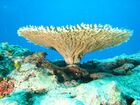Organization:Reef Check
 | |
| Founded | 1996 |
|---|---|
| Founder | Gregor Hodgson |
| Type | NGO |
| Focus | Ocean conservation |
| Location |
|
Area served | Global |
| Method | Scientific research |
Revenue | Grants and donations |
| Website | reefcheck.org |
Reef Check is an international non-governmental organization dedicated to the conservation of two ecosystems: tropical coral reefs and temperate kelp forests. The Foundation is headquartered in California, United States, but uses data from volunteer scuba diver teams in over 80 countries, ranging from Australia, Japan, to even Germany. It is the United Nations’ official coral reef monitoring program.[1][2][3]
History
Reef Check first conducted a global survey of coral reef health in 1997. The data confirmed that coral reefs were in crisis due to overfishing, pollution and other human impacts.[4] The published results in 1999 unsettled the coral biologist community, as the extent of impacts were not realized.
"The Global Coral Reef Crisis: Trends and Solutions (1997-2001)", a five-year report on coral reefs, was released in 2002 at the World Summit on Sustainable Development in Johannesburg, South Africa.[5] The report used data collected by thousands of volunteers worldwide, and was the first scientific document detailing the decline in coral reef health over a five-year period.
In 2005, Reef Check launched its first temperate reef program in California, collecting data on California’s kelp forests with the goal to inform the emerging statewide Marine Protected Area (MPA) network.[6] Since then, Reef Check’s Kelp Forest Monitoring Program has grown to be the largest scuba-based citizen science program.
In 2016, this program expanded into climate change monitoring and is now providing ocean temperature data from over 75 sites.
In 2020, Reef Check began working on restoring kelp forests, with the hope of reversing some of the devastating collapse of these ecosystems along the North American West Coast. The focus of this program is on community-based restoration by engaging volunteers and providing economic benefit to the local communities that depend on the ocean environment who are the most hard-hit by the loss of kelp in many regions.
Reef Check's Dive into Science program, launched in 2019, is designed to provide scuba and scientific diving skills for groups that have been historically absent in this effort, including tribes, low-income communities of color, and foster youth.
Mission and goals
Reef Check endeavors to create partnerships among communities, government agencies, businesses, universities and other non-profits. Reef Check's mission is "to empower people to save our reefs and oceans".
Monitoring methods

For its coral reef monitoring protocol, Reef Check volunteer divers are trained to study a designated site annually or sometimes quarterly. Underwater surveyors focus chiefly on sessile invertebrates (benthos), along a 100-meter (330 ft) transect line.[7][8][9]
Four spatial replicates (spanning 20 m (66 ft)) are studied with three 5 m (16 ft) gaps between. The survey is sub-divided to allow paired divers to separately observe substrate, photograph macroinvertebrates and impacts, record video, and count fishes. A site-specific description is also documented.
Programs
Reef Check carries out its work through four major programs: the Coral Reef Program,[10] Kelp Forest Program,[11] Kelp Restoration Program,[12] and Dive into Science Program.[13]
See also
- Organization:Project AWARE – Marine conservation non-profit organization for recreational divers
- Organization:Coral Reef Alliance (CORAL) – Non-profit, environmental NGO
- Organization:Reef Life Survey – Marine life monitoring programme based in Hobart, Tasmania
- Organization:Rubicon Foundation – Non-profit organization for promoting research and information access for underwater diving
- Shifting baseline – Type of change to how a system is measured
- Citizen science – Amateur scientific research
- Social:Ecotourism – Tourism visiting environments
References
- ↑ Reef Check Australia. "Reef Check Worldwide". http://www.reefcheckaustralia.org/about/reef-check-worldwide/index.cfm.
- ↑ Greg Stolz (2008-04-04). "More checks as coral suffers". The Courier-Mail. http://www.news.com.au/couriermail/story/0,23739,23485856-3102,00.html.
- ↑ United Nations. "International Coral Reef Action Network (ICRAN)". http://webapps01.un.org/dsd/partnerships/public/partnerships/129.html.
- ↑ Hodgson, G. (1999). "A Global Assessment of Human Effects on Coral Reefs". Marine Pollution Bulletin 38 (5): 345–355. doi:10.1016/S0025-326X(99)00002-8. Bibcode: 1999MarPB..38..345H. http://reefcheck.org/about_RC_Reef/publications/mpb.pdf. Retrieved 2008-06-17.
- ↑ "The Global Coral Reef Crisis: Trends and Solutions (1997-2001)". Reef Check Report. 2002. http://www.reefcheck.org/about_RC_Reef/publications/Reef%20Check%20Report.pdf/Reef%20Check%205%20Year%20Report.pdf. Retrieved 2008-06-17.
- ↑ Wehrenberg, ML; Freiwald, J (2012). "Reef Check California: Applied Ecosystem Monitoring as a Training Tool for AAUS Programs". In: Steller D, Lobel L, Eds. Diving for Science 2012. Proceedings of the American Academy of Underwater Sciences 31st Symposium. Dauphin Island, AL. http://archive.rubicon-foundation.org/10298. Retrieved 2013-10-17.
- ↑ Shuman CS (2007). "Reef Check California Monitoring Protocol 2007". Reef Check California Protocol-2007. http://reefcheck.org/PDFs/2007_RC_CA_Protocol.pdf. Retrieved 2008-06-17.
- ↑ Reef Check. "Monitoring Instruction". http://reefcheck.org/ecoaction/Monitoring_Instruction.php.
- ↑ Reef Check. "Long Term Monitoring". http://reefcheck.org/conservation/long_term_monitoring.php.
- ↑ "Coral Reef Program | Reef Check Foundation" (in en). https://www.reefcheck.org/tropical-program/.
- ↑ "Kelp Forest Program | Sustainable Reefs | Reef Check Foundation" (in en). https://www.reefcheck.org/kelp-forest-program/.
- ↑ "Kelp Restoration" (in en). https://www.reefcheck.org/kelp-forest-program/kelp-restoration/.
- ↑ "Dive into Science Program" (in en). https://www.reefcheck.org/dive-into-science-program/.
Further reading
- Joyce, K.E., Phinn, SR, Roelfsema, CM, Neil, DT and WC Dennison. 2004. Combining Landsat ETM plus and Reef Check classifications for mapping coral reefs: A critical assessment from the southern Great Barrier Reef, Australia. Journal of Coral Reefs. Vol 23, Issue 1. pp 21–25. Springer Publ, New York, NY.
External links
- Official Website
- Reef Check Australia (Australian counterpart)
- Reef Check Dominican Republic (Dominican Republic counterpart)
- Global Coral Reef Monitoring Network[Usurped!] (GCRMN)
- International Coral Reef Initiative (ICRI)
- Reef Environmental Education Foundation (REEF)
- International Coral Reef Action Network (ICRAN)
 |

